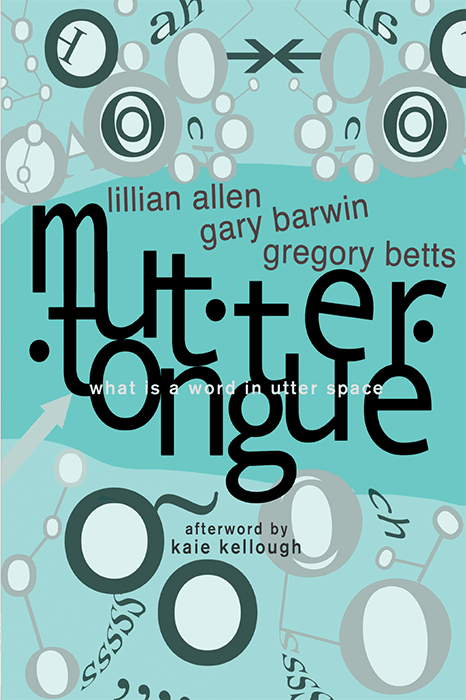Lillian Allen, Gary Barwin and Gregory Betts’ Muttertongue: What is a word in utter space
Reviewed by Dawn Macdonald
Muttertongue is a cacophonous, multifarious and entirely thrilling concatenation of sounds and styles, a controlled explosion produced where dub meets concrete (poetry). The project includes a book and an album. You should listen to the album first, then read the book, then re-read the book while listening to the album, and then probably go lie down for a while.
I’m not sure how much to go into the history of dub poetry here. Suffice to say it’s a spoken- and written-word form originating in Jamaica (names to check here include Linton Kwesi Johnson and Oku Onoura). There’s a vibrant Canadian scene centred on Toronto’s Jamaican community, with Lillian Allen firmly at its helm.
Here she’s joined by two colleagues not so readily associated with the Caribbean diaspora: the poet, composer and multimedia artist Gary Barwin, alongside poet and academic Gregory Betts who’s known for his interest in the experimental and avant-garde. Together they form The Muttertongue Trio. The collaboration is not so odd as you might think. The Caribbean has long been post-modern, a site where language, music, and culture participate in an aesthetic of mashup and remix. As Allen makes clear in the book’s introductory section, “Dub sees itself as avant-garde, rushing the gates, trampling walls, calling for voice and unity against oppression. An empowering repositioning of the term.”
The tracks on the Muttertongue album range from pure sound poetry (non-referential and without accompanying instrumentation) to an elevated and accelerated scat over smooth saxophone jazz, to something recognizable as spoken word. “Woken & Unbroken” is the one track you might be most likely to play at a party, with full musical underlay in a dub-amplified reggae riddim, and Allen’s voice exhorting the listener, “Is it a voice if it speaks? Is it a voice if it creaks?” and then, “Revolution it teach.”
Turning to the book, we experience echoes of the album, but the two artifacts are separate and complementary. This isn’t a set of liner notes or a lyrics sheet. The book opens with a “trialogue” between Allen, Barwin and Betts talking out some of the thoughts that have guided them in this work. Barwin talks about exploring the sounds and letterforms of Yiddish and Hebrew without linguistic comprehension: “How I’m realizing that I feel it in my spine, this mamaloshen, this smotheredtongue that was the language of my grandparents ….”
Betts muses, “I guess, language for me is like a lightning spark between two electric bodies. (And not necessarily living bodies.) That blue bolt that passes between us. It connects us to each other, but it can hurt, too, can leave a scar, and it can just as easily signal distance and error as provide a bridge or succour to the other.”
Allen recalls time spent with her pre-verbal granddaughter, whose “sounds remind me that sounds exist outside language; the languages we know.” As she puts it later in the transcribed conversation, “I’m thinking of how we are all stuck in our own language, not just the words, though words are such suckers for their limitations, mere approximation and power to colonize with abstractions.”
Muttertongue moves beyond word and even beyond sound into visual display. Illustration, diagram, typography, and distortion of letterforms face off against the linearity of written text. At times abstract shapes seem to conceal and suppress the text (and intriguingly, this includes some of the more distinctively Jamaican speech, appearing in snippets sliced open by gutters or folded underneath flaps). Unreadably tiny words hang from strings in patterns recalling weavers’ designs. Barely legible text warps into a sucking hole. Shy words hide inside a box made of words.
Muttertongue is the mother tongue, the muttering, and the uttering. It’s what comes before words; it’s the trace the words leave behind. It’s the poetry that’s outside of poetry, inside breath, simply breathing.
About the Authors
Lillian Allen is a dub poet, writer, Juno Award winner; the City of Toronto’ s seventh poet laureate; a creative writing professor at OCAD University. She publishes widely in print and audio, and lectures/performs internationally. Gary Barwin is a writer, multimedia artist, performer, musician, and author of 32 books. His music, art, and writing have been performed, exhibited, published and broadcast internationally. Gregory Betts is a poet and professor at Brock University. His work explores concrete, constrained, or collaborative poetics. He is the author of 11 books of poetry.
About the Reviewer
Dawn Macdonald lives in Whitehorse, Yukon, where she grew up without electricity or running water. She won the 2025 Canadian First Book Prize for her poetry collection Northerny. She posts weekly at Reviews of Books I Got for Free or Cheap (on Substack), as well as reviewing for journals and for The Seaboard Review of Books.
Book Details
Exile Editions, 2025 • 6 x 9 inches • PB, French Flaps, 63 pages • 978-1-55096-985-6





